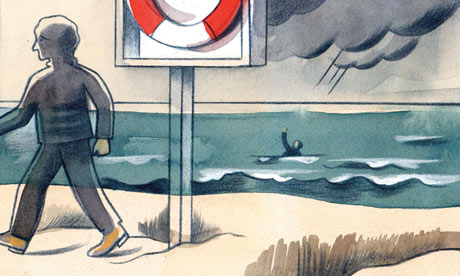The nasty babble which stigmatises depression
Mental health debate is like a pre-Enlightenment scream in its ignorance. Will Ed Miliband's words have any effect?
 Tanya Gold The Guardian,
Tanya Gold The Guardian, 
'The mentally ill are now rarely shut away but they are too often objects of derision, considered complicit in their illness.' Illustration by Toby Morison
Denial is bliss. Ed Miliband's speech on mental illness was largely ignored last week, blown away by Hurricane Sandy, because we prefer a catastrophe we can see. In fact, it was all sensible. Miliband called mental health "a taboo running across our society", noted the financial burden to business of ignoring it (£26bn a year) and reported that the World Health Organisation (WHO) thinks that by 2030 depression will be the leading cause of disease on earth.
He wants to rewrite the NHS constitution to give patients a right to therapy, as well as to drugs. Critics will call it "a creeping Hampstead-isation of normal British brains", I am sure. What happened to those ordinary coping mechanisms – stiff lips and drink?
Miliband was brave to talk about mental health because it was also the week that Felicia Boots told a court that she had killed her babies. Boots had postnatal depression: she said that she had stopped taking medication because she feared it would pollute her breast milk, and, if this were discovered, the babies would be taken from her. It is possible that, were postnatal depression not a taboo and were Boots given psychotherapy without fuss or pleading, this calamity would have been averted.
The Lancet reports that, in a survey, 79% of depressives said that they had experienced discrimination; if Boots feared to speak there was, at least, one sense in which she was not alone.
Since the royal family sent the epileptic Prince John away in 1917 so people would not associate them with madness, there has been some creeping change. The mentally ill are now rarely shut away but they are too often objects of derision, either considered laughable or complicit in their illness.
It is little known that recovery is possible or even, in some cases, probable; mental health debate often feels like a pre-Enlightenment scream, full of shame and monsters. That vast numbers of the population (one in four according to WHO) will at some point be affected makes the stigma more childish and self-hating. It is elective lunacy, an infant's game.
Here are some examples of public attitudes towards mental illness, which got more space than Miliband's speech. There is Derek, Ricky Gervais's comedy about a "simple" man (shamefully commissioned for a full series by Channel 4). There are reports of bystanders screaming for suicidal depressives to hurl themselves from buildings, because they have confused television with life.
There is Jeremy Clarkson, whose need to go fast in a car is very strange, arguing in the Sun that if you are suicidal, throwing yourself in front of a train, "is a very selfish way to go because the disruption it causes is immense". The train driver should, under such circumstances, "get the train moving as soon as possible and let foxy woxy and the birds nibble away at the smaller, gooey parts that are far away and hard to find". Clarkson is one of Britain's best-known TV presenters, yet he advocates feeding "Johnny Suicide" to foxy woxy because he is an idiot.
Swaths of the rightwing media write lies about mental illness. Miliband mentioned Clarkson and Janet Street-Porter, who wrote in the Daily Mail: "The misery movement has rapidly gathered momentum and in recent months it's become apparent that, along with the Sam Cam handbag, the latest must-have accessory is a big dose of depression." Depression does terrible things to the victim, it is true, but leather goods are not involved; then Street-Porter plugged her book.
Damian Thompson of the Daily Telegraph insulted Alcoholics Anonymous: even those attending self-help groups are, in his mind, losers of the most desperate kind. He happily told tales about AA meetings he attended; then he plugged his book.
Cristina Odone, also of the Daily Telegraph, thinks that antidepressants should be criminalised: at least, I think that is what she meant. Sometimes it is hard to tell what Odone desires beyond a tyranny of twee niceness, where no one is an alcoholic, or has an abortion, or is poor.
Peter Hitchens of the Mail on Sunday, meanwhile, tells his 6 million readers that all drug use is a moral failure, enjoys the frisson of the backlash, and then, inevitably, plugs his book. This is the thrashing of the ignorant, who should be ashamed of their ignorance, but seem instead to like it.
The coalition government, it is true, does not verbally insult the mentally ill unless they are also poor. Shrinking the state is everything with them, so they can make nice when it costs nothing – that is why David Cameron hugged a husky on a glacier. (Huskies? Depressives? Cinzano Bianco fans? Who cares?)
However, the nasty babble of the commentariat creates a culture where it does no harm to ignore the mentally ill. The government backs some initiatives that are sweet and cheap – there is Time to Change, an awareness campaign, and it says it will support a mental health discrimination bill which is before parliament – but neither of these are as important as treatment.
Miliband noted that 2011 was the first year in a decade that mental health provision was cut. Of course, the long-term mentally ill are disproportionately poor: cuts to disability benefit, legal aid and NHS mental health services will harm them disproportionately. Will funding be found for the illness you cannot see, when denial is such bliss?
Twitter: @TanyaGold1
He wants to rewrite the NHS constitution to give patients a right to therapy, as well as to drugs. Critics will call it "a creeping Hampstead-isation of normal British brains", I am sure. What happened to those ordinary coping mechanisms – stiff lips and drink?
Miliband was brave to talk about mental health because it was also the week that Felicia Boots told a court that she had killed her babies. Boots had postnatal depression: she said that she had stopped taking medication because she feared it would pollute her breast milk, and, if this were discovered, the babies would be taken from her. It is possible that, were postnatal depression not a taboo and were Boots given psychotherapy without fuss or pleading, this calamity would have been averted.
The Lancet reports that, in a survey, 79% of depressives said that they had experienced discrimination; if Boots feared to speak there was, at least, one sense in which she was not alone.
Since the royal family sent the epileptic Prince John away in 1917 so people would not associate them with madness, there has been some creeping change. The mentally ill are now rarely shut away but they are too often objects of derision, either considered laughable or complicit in their illness.
It is little known that recovery is possible or even, in some cases, probable; mental health debate often feels like a pre-Enlightenment scream, full of shame and monsters. That vast numbers of the population (one in four according to WHO) will at some point be affected makes the stigma more childish and self-hating. It is elective lunacy, an infant's game.
Here are some examples of public attitudes towards mental illness, which got more space than Miliband's speech. There is Derek, Ricky Gervais's comedy about a "simple" man (shamefully commissioned for a full series by Channel 4). There are reports of bystanders screaming for suicidal depressives to hurl themselves from buildings, because they have confused television with life.
There is Jeremy Clarkson, whose need to go fast in a car is very strange, arguing in the Sun that if you are suicidal, throwing yourself in front of a train, "is a very selfish way to go because the disruption it causes is immense". The train driver should, under such circumstances, "get the train moving as soon as possible and let foxy woxy and the birds nibble away at the smaller, gooey parts that are far away and hard to find". Clarkson is one of Britain's best-known TV presenters, yet he advocates feeding "Johnny Suicide" to foxy woxy because he is an idiot.
Swaths of the rightwing media write lies about mental illness. Miliband mentioned Clarkson and Janet Street-Porter, who wrote in the Daily Mail: "The misery movement has rapidly gathered momentum and in recent months it's become apparent that, along with the Sam Cam handbag, the latest must-have accessory is a big dose of depression." Depression does terrible things to the victim, it is true, but leather goods are not involved; then Street-Porter plugged her book.
Damian Thompson of the Daily Telegraph insulted Alcoholics Anonymous: even those attending self-help groups are, in his mind, losers of the most desperate kind. He happily told tales about AA meetings he attended; then he plugged his book.
Cristina Odone, also of the Daily Telegraph, thinks that antidepressants should be criminalised: at least, I think that is what she meant. Sometimes it is hard to tell what Odone desires beyond a tyranny of twee niceness, where no one is an alcoholic, or has an abortion, or is poor.
Peter Hitchens of the Mail on Sunday, meanwhile, tells his 6 million readers that all drug use is a moral failure, enjoys the frisson of the backlash, and then, inevitably, plugs his book. This is the thrashing of the ignorant, who should be ashamed of their ignorance, but seem instead to like it.
The coalition government, it is true, does not verbally insult the mentally ill unless they are also poor. Shrinking the state is everything with them, so they can make nice when it costs nothing – that is why David Cameron hugged a husky on a glacier. (Huskies? Depressives? Cinzano Bianco fans? Who cares?)
However, the nasty babble of the commentariat creates a culture where it does no harm to ignore the mentally ill. The government backs some initiatives that are sweet and cheap – there is Time to Change, an awareness campaign, and it says it will support a mental health discrimination bill which is before parliament – but neither of these are as important as treatment.
Miliband noted that 2011 was the first year in a decade that mental health provision was cut. Of course, the long-term mentally ill are disproportionately poor: cuts to disability benefit, legal aid and NHS mental health services will harm them disproportionately. Will funding be found for the illness you cannot see, when denial is such bliss?
Twitter: @TanyaGold1

No comments:
Post a Comment